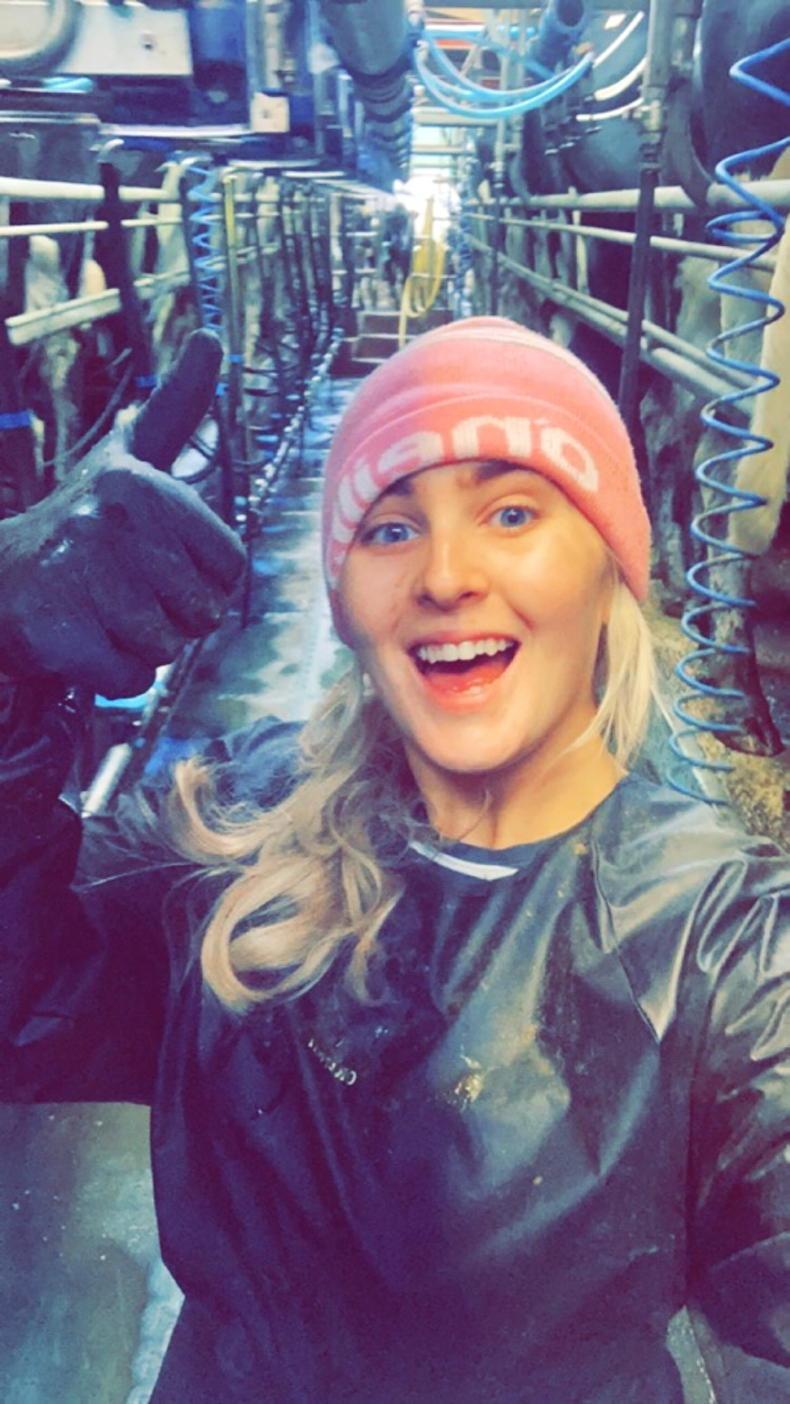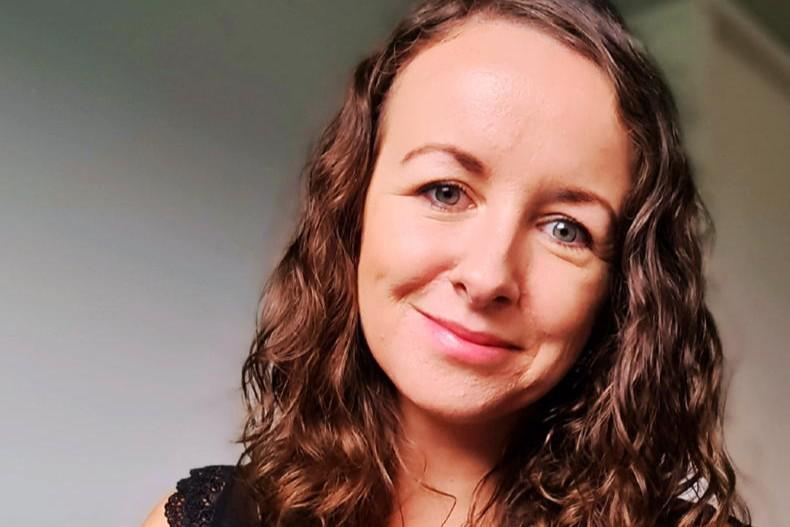Katie O’Callaghan comes from a farming background. Her grandfather was a popular contractor and potato grower around the Cooley Peninsula in the 1980s.
“I always had an interest in agriculture; growing up on a lowland sheep farm,” she explains. “I grew up [surrounded by] sheep and feeding pet lambs.”
Her interest for the subject peaked when studying agricultural science for the Leaving Cert.
“I really enjoyed it due to my teacher, a Monaghan woman, making the course very enjoyable and relating it to real life through visits and videos,” she says.
After this, Katie knew she wanted to continue her studies in this field at third level.
Practical experience
From visiting open days at Ballyhaise Agriculture College and Dundalk Institute of Technology (DkIT), the Bsc Honours degree in Sustainable Agriculture stood out to Katie.
“I really liked the idea of splitting the college days between both colleges – Ballyhaise providing practical modules on the farm and in the classroom whilst DkIT provides technical modules.”
Katie felt this was a great balance as she is a practical person who learns by doing things.
“This course was perfect for me as it wasn’t all just theory-based in the classroom. It had lots of practicals such as grass measuring, lambing, tractor driving, dosing, and injecting animals.”
a Grá for dairy
Due to the course providing a 12-week internship in the third year within the agri sector, Katie says it allowed her to “test the water” in the area of quality control.
As this internship was held during the COVID-19 pandemic, it was quite difficult for Katie to secure a role, due to strict regulations.
“I was delighted to have completed my 12-week placement within The Next Box Egg Company, Co Monaghan, in which I continued to work for the next year after my placement experience,” she says.
Katie continues, “This is how I got to know that the area of quality control was for me, due to the fast-paced, ever-changing environment in which you have to constantly react to consumer needs and also the changing environment. [For example,] Avian Influenza was a big issue within the poultry sector at the time.”
I had never worked with cows and had never stepped into a milking parlour, but this was the best thing I ever did.
While she enjoyed her work with poultry, the opportunity to carry out a farm placement during her degree helped Katie find a grá for the dairy industry.
“I had never worked with cows and had never stepped into a milking parlour, but this was the best thing I ever did. I completed my farm placement on Eugene Oliver’s farm in the Cooley Peninsula, which is where my love for the sector was built,” she explains.

Katie O'Callaghan at her graduation with her Mum
academic excellence
Katie received not one or two, but three academic awards throughout her final year in college. She was awarded the ABP prize for Agri-Food Student of the Year, the President’s Prize for Academic Excellence and the Shane Dromgoole Prize.
“I was very lucky to have won three awards, which I was presented with during the graduation ceremony,” she recalls. “I understood from the layout of the DkIT course that our degree award was based on year four results. I did not set out to win any awards and wasn’t even aware they existed, I was just determined to achieve a 1:1 degree result.” When Breda Brennan (the department head) called Katie in the summer of last year, she was very surprised.
“I nearly fell off my seat with shock. It really does show hard work and attention to detail paid off.”
The Shane Dromgoole Prize is an award sponsored by Shane Dromgoole’s family. Shane taught a module offered in final year, called “Herd Health and Biosecurity”. He unfortunately passed away due to ill health.
“This award is given to the student with the highest marks in this module,” Katie says. “I really enjoyed this module; learning all about the different diseases animals can pick up and how as farmers we can manage them.”
Life after college
Prior to graduating, Katie secured a job with Tirlán (previously Glanbia). She started this role in June, after finishing college in May.
“I thought it was very important to get into the working world as soon as possible to allow all I learned within the degree course to be put into practice,” she explains.
After completing her degree course, the area that most interested Katie was the dairy industry, so making a career within the sector an obvious choice for her.

Katie O'Callaghan
“Overall, getting the chance to work for Ireland''s largest dairy processor – Tirlán – I was very privileged to have secured an interview and have obtained a full-time role,” she says.
Her current role is a quality coordinator in Tirlán’s UHT plant in Lough Egish, Co Monaghan.
Here, all products are processed and ultimately destined for export (UHT cream and milk). Katie''s current responsibilities include: maintaining, improving and ensuring quality on-site, from product coming in to product leaving; and working as a quality team responsible for any audits, including those with Bord Bia, the Department of Agriculture, Food and the Marine (DAFM) or the National Dairy Council (NDC).
For anyone looking to study agriculture at college, and particularly for young women, Katie advises: “Just do it.”
“I never regretted my decision and would 100% recommend the DkIT sustainable agriculture course as it sets you up perfectly for the working world,” she adds.
Katie continues, “I would also advise students to never say no to new opportunities – for example, I chose to do my work placement within the dairy sector even though I had never worked with cattle.
From completing this work placement and being open to change, I have found a passion for milking and working with dairy animals. This has led me to the career I am in today.”
“I would also say that the DkIT course has seen a huge increase in female participation. I feel the agri sector is changing – and changing for the better with more female involvement, which is great to see.” CL
Read more
The impacts of artificial intelligence on education
‘Young people have the power to influence the agricultural sector'
Katie O’Callaghan comes from a farming background. Her grandfather was a popular contractor and potato grower around the Cooley Peninsula in the 1980s.
“I always had an interest in agriculture; growing up on a lowland sheep farm,” she explains. “I grew up [surrounded by] sheep and feeding pet lambs.”
Her interest for the subject peaked when studying agricultural science for the Leaving Cert.
“I really enjoyed it due to my teacher, a Monaghan woman, making the course very enjoyable and relating it to real life through visits and videos,” she says.
After this, Katie knew she wanted to continue her studies in this field at third level.
Practical experience
From visiting open days at Ballyhaise Agriculture College and Dundalk Institute of Technology (DkIT), the Bsc Honours degree in Sustainable Agriculture stood out to Katie.
“I really liked the idea of splitting the college days between both colleges – Ballyhaise providing practical modules on the farm and in the classroom whilst DkIT provides technical modules.”
Katie felt this was a great balance as she is a practical person who learns by doing things.
“This course was perfect for me as it wasn’t all just theory-based in the classroom. It had lots of practicals such as grass measuring, lambing, tractor driving, dosing, and injecting animals.”
a Grá for dairy
Due to the course providing a 12-week internship in the third year within the agri sector, Katie says it allowed her to “test the water” in the area of quality control.
As this internship was held during the COVID-19 pandemic, it was quite difficult for Katie to secure a role, due to strict regulations.
“I was delighted to have completed my 12-week placement within The Next Box Egg Company, Co Monaghan, in which I continued to work for the next year after my placement experience,” she says.
Katie continues, “This is how I got to know that the area of quality control was for me, due to the fast-paced, ever-changing environment in which you have to constantly react to consumer needs and also the changing environment. [For example,] Avian Influenza was a big issue within the poultry sector at the time.”
I had never worked with cows and had never stepped into a milking parlour, but this was the best thing I ever did.
While she enjoyed her work with poultry, the opportunity to carry out a farm placement during her degree helped Katie find a grá for the dairy industry.
“I had never worked with cows and had never stepped into a milking parlour, but this was the best thing I ever did. I completed my farm placement on Eugene Oliver’s farm in the Cooley Peninsula, which is where my love for the sector was built,” she explains.

Katie O'Callaghan at her graduation with her Mum
academic excellence
Katie received not one or two, but three academic awards throughout her final year in college. She was awarded the ABP prize for Agri-Food Student of the Year, the President’s Prize for Academic Excellence and the Shane Dromgoole Prize.
“I was very lucky to have won three awards, which I was presented with during the graduation ceremony,” she recalls. “I understood from the layout of the DkIT course that our degree award was based on year four results. I did not set out to win any awards and wasn’t even aware they existed, I was just determined to achieve a 1:1 degree result.” When Breda Brennan (the department head) called Katie in the summer of last year, she was very surprised.
“I nearly fell off my seat with shock. It really does show hard work and attention to detail paid off.”
The Shane Dromgoole Prize is an award sponsored by Shane Dromgoole’s family. Shane taught a module offered in final year, called “Herd Health and Biosecurity”. He unfortunately passed away due to ill health.
“This award is given to the student with the highest marks in this module,” Katie says. “I really enjoyed this module; learning all about the different diseases animals can pick up and how as farmers we can manage them.”
Life after college
Prior to graduating, Katie secured a job with Tirlán (previously Glanbia). She started this role in June, after finishing college in May.
“I thought it was very important to get into the working world as soon as possible to allow all I learned within the degree course to be put into practice,” she explains.
After completing her degree course, the area that most interested Katie was the dairy industry, so making a career within the sector an obvious choice for her.

Katie O'Callaghan
“Overall, getting the chance to work for Ireland''s largest dairy processor – Tirlán – I was very privileged to have secured an interview and have obtained a full-time role,” she says.
Her current role is a quality coordinator in Tirlán’s UHT plant in Lough Egish, Co Monaghan.
Here, all products are processed and ultimately destined for export (UHT cream and milk). Katie''s current responsibilities include: maintaining, improving and ensuring quality on-site, from product coming in to product leaving; and working as a quality team responsible for any audits, including those with Bord Bia, the Department of Agriculture, Food and the Marine (DAFM) or the National Dairy Council (NDC).
For anyone looking to study agriculture at college, and particularly for young women, Katie advises: “Just do it.”
“I never regretted my decision and would 100% recommend the DkIT sustainable agriculture course as it sets you up perfectly for the working world,” she adds.
Katie continues, “I would also advise students to never say no to new opportunities – for example, I chose to do my work placement within the dairy sector even though I had never worked with cattle.
From completing this work placement and being open to change, I have found a passion for milking and working with dairy animals. This has led me to the career I am in today.”
“I would also say that the DkIT course has seen a huge increase in female participation. I feel the agri sector is changing – and changing for the better with more female involvement, which is great to see.” CL
Read more
The impacts of artificial intelligence on education
‘Young people have the power to influence the agricultural sector'













SHARING OPTIONS